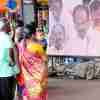Kodava community demands virtual constituency on the lines of intangible seat for Buddhists in Sikkim
The Hindu
Kodavas are a unique community, but are becoming numerically negligible due to a decline in population. A virtual constituency is their attempt at political relevancy
Members of the Kodava community, in the hill district of Kodagu, are demanding exclusive, intangible constituencies in Parliament and the Karnataka Assembly on the lines of the Sangha virtual constituency for the Buddhist monastic community in Sikkim.
The Codava National Council (CNC), a body fighting for autonomy for Kodava people, fears that the community may lose political representation after the delimitation exercise in the year 2026, since the population of the community is coming down.
Kodagu district is one of the smallest districts in Karnataka. It was a Part ‘C’ State from 1952 to 1956. It was amalgamated with the then Mysuru State (now Karnataka) in 1956.
Recently, CNC members submitted a memorandum to the President, Union Law Minister and Chief Election Commission of India seeking creation of a virtual constituency for the Kodava community.
Nandineravanda U. Nachappa, president of CNC, told The Hindu, “Indian government ratified the rights of Buddhist monastic community through the Sangha constituency, which was created in 1958.” He argued for a similar arrangement for the Kodavas, who are a unique community but are becoming numerically negligible.
Sangha Assembly constituency is one of the constituencies in the 32-member Assembly of Sikkim, a State in the northeast region of India.
“The Sangha constituency doesn’t exist on the map. This seat is reserved for the Buddhist monastic community of Sikkim — Buddhist monks and nuns. About 3,293 voters registered with the 111 recognized monasteries in Sikkim State are the only ones who can contest and cast their votes for the Sangha constituency seat.













